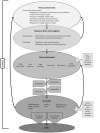Policy Action Within Urban African Food Systems to Promote Healthy Food Consumption: A Realist Synthesis in Ghana and Kenya
- PMID: 33619936
- PMCID: PMC9309963
- DOI: 10.34172/ijhpm.2020.255
Policy Action Within Urban African Food Systems to Promote Healthy Food Consumption: A Realist Synthesis in Ghana and Kenya
Abstract
Background: Obesity and nutrition-related non-communicable diseases (NR-NCDs) are increasing throughout Africa, driven by urbanisation and changing food environments. Policy action has been limited - and influenced by high income countries. Socio-economic/political environments of African food systems must be considered in order to understand what policy might work to prevent NR-NCDs, for whom, and under what circumstances.
Methods: A realist synthesis of five policy areas to support healthier food consumption in urban Africa: regulating trade/foreign investment; regulating health/nutrition claims/labels; setting composition standards for processed foods; restricting unhealthy food marketing; and school food policy. We drew upon Ghana and Kenya to contextualise the evidence base. Programme theories were generated by stakeholders in Ghana/Kenya. A two-stage search interrogated MEDLINE, Web of Science and Scopus. Programme theories were tested and refined to produce a synthesised model.
Results: The five policies operate through complex, inter-connected pathways moderated by global-, national- and local contexts. Consumers and the food environment interact to enable/disable food accessibility, affordability and availability. Consumer relationships with each other and retailers are important contextual influences, along with political/ economic interests, stakeholder alliances and globalized trade. Coherent laws/regulatory frameworks and government capacities are fundamental across all policies. The increasing importance of convenience is shaped by demographic and sociocultural drivers. Awareness of healthy diets mediates food consumption through comprehension, education, literacy and beliefs. Contextualised data (especially food composition data) and inter-sectoral collaboration are critical to policy implementation.
Conclusion: Evidence indicates that coherent action across the five policy areas could positively influence the healthiness of food environments and consumption in urban Africa. However, drivers of (un)healthy food environments and consumption reflect the complex interplay of socio-economic and political drivers acting at diverse geographical levels. Stakeholders at local, national, and global levels have important, yet differing, roles to play in ensuring healthy food environments and consumption in urban Africa.
Keywords: Africa; Food Consumption; Food Environments; Food Policy; Realist Review.
© 2021 The Author(s); Published by Kerman University of Medical Sciences. This is an open-access article distributed under the terms of the Creative Commons Attribution License (http://creativecommons.org/licenses/by/4.0), which permits unrestricted use, distribution, and reproduction in any medium, provided the original work is properly cited.
Similar articles
-
Benchmarking food environment policies for the prevention of diet-related non-communicable diseases in Kenya: National expert panel's assessment and priority recommendations.PLoS One. 2020 Aug 6;15(8):e0236699. doi: 10.1371/journal.pone.0236699. eCollection 2020. PLoS One. 2020. PMID: 32760079 Free PMC article.
-
Unhealthy eating practices of city-dwelling Africans in deprived neighbourhoods: Evidence for policy action from Ghana and Kenya.Glob Food Sec. 2020 Sep;26:100452. doi: 10.1016/j.gfs.2020.100452. Glob Food Sec. 2020. PMID: 33324537 Free PMC article.
-
Strengthening the governance of food systems for nutrition in Africa: a political economy analysis of food policy in South Africa and Ghana.Public Health Nutr. 2024 Nov 28;27(1):e243. doi: 10.1017/S1368980024001356. Public Health Nutr. 2024. PMID: 39607677 Free PMC article.
-
The effectiveness, cost-effectiveness and policy processes of regulatory, voluntary and partnership policies to improve food environments: an evidence synthesis.Public Health Res (Southampt). 2024 Sep;12(8):1-173. doi: 10.3310/JYWP4049. Public Health Res (Southampt). 2024. PMID: 39323285
-
International Trade and Investment Agreements as Barriers to Food Environment Regulation for Public Health Nutrition: A Realist Review.Int J Health Policy Manag. 2021 Dec 1;10(12):745-765. doi: 10.34172/ijhpm.2020.189. Int J Health Policy Manag. 2021. PMID: 33105969 Free PMC article. Review.
Cited by
-
Analyzing consumer behaviour towards food and nutrition labeling: A comprehensive review.Heliyon. 2023 Aug 25;9(9):e19401. doi: 10.1016/j.heliyon.2023.e19401. eCollection 2023 Sep. Heliyon. 2023. PMID: 37681180 Free PMC article. Review.
-
The role of food environment policies in making unhealthy foods unattractive and healthy foods available in Africa.EClinicalMedicine. 2021 May 23;36:100908. doi: 10.1016/j.eclinm.2021.100908. eCollection 2021 Jun. EClinicalMedicine. 2021. PMID: 34041465 Free PMC article. No abstract available.
-
Making food-related health taxes palatable in sub-Saharan Africa: lessons from Ghana.BMJ Glob Health. 2023 Oct;8(Suppl 8):e012154. doi: 10.1136/bmjgh-2023-012154. BMJ Glob Health. 2023. PMID: 37813441 Free PMC article.
-
Environmental Sustainability of Food Environments: Development and Application of a Framework in 4 cities in South Asia.Curr Dev Nutr. 2024 Jun 11;8(7):103791. doi: 10.1016/j.cdnut.2024.103791. eCollection 2024 Jul. Curr Dev Nutr. 2024. PMID: 39045144 Free PMC article.
-
Alien introgression to wheat for food security: functional and nutritional quality for novel products under climate change.Front Nutr. 2024 Jun 12;11:1393357. doi: 10.3389/fnut.2024.1393357. eCollection 2024. Front Nutr. 2024. PMID: 38933881 Free PMC article. Review.
References
-
- World Health Organization (WHO). The Double Burden of Malnutrition: Policy Brief. WHO; 2016.
-
- Ghana Statistical Service (GSS), Ghana Health Service (GHS), ICF International. Ghana Demographic and Health Survey 2014. Rockville, Maryland, USA: GSS, GHS, ICF International; 2015.
-
- Kenya National Bureau of Statistics. Kenya STEPwise Survey for Non-Communicable Diseases Risk Factors 2015 Report. Nairobi, Kenya: Ministry of Health, Kenya National Bureau of Statistics, WHO; 2015.
MeSH terms
Grants and funding
LinkOut - more resources
Full Text Sources
Other Literature Sources


